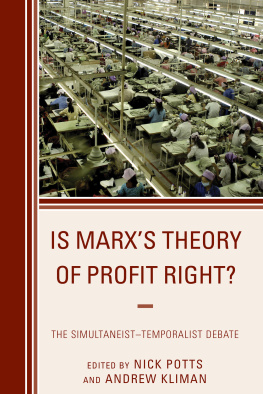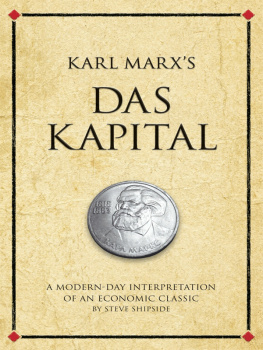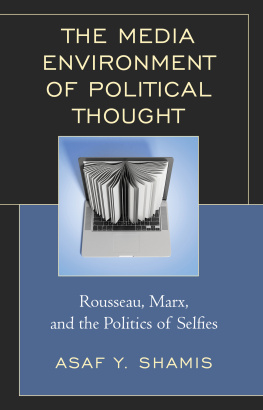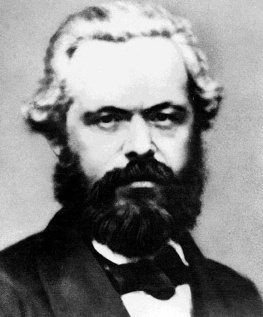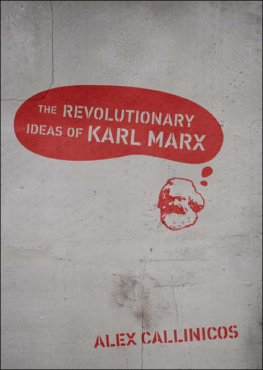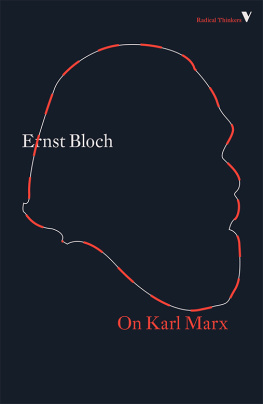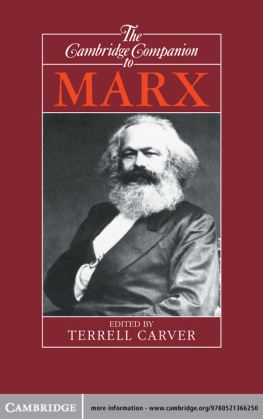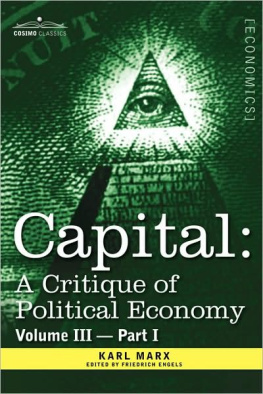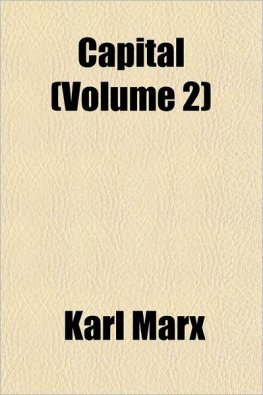Marx Karl - Marx and Education
Here you can read online Marx Karl - Marx and Education full text of the book (entire story) in english for free. Download pdf and epub, get meaning, cover and reviews about this ebook. City: London;New York, year: 2017, publisher: Routledge, genre: Politics. Description of the work, (preface) as well as reviews are available. Best literature library LitArk.com created for fans of good reading and offers a wide selection of genres:
Romance novel
Science fiction
Adventure
Detective
Science
History
Home and family
Prose
Art
Politics
Computer
Non-fiction
Religion
Business
Children
Humor
Choose a favorite category and find really read worthwhile books. Enjoy immersion in the world of imagination, feel the emotions of the characters or learn something new for yourself, make an fascinating discovery.
- Book:Marx and Education
- Author:
- Publisher:Routledge
- Genre:
- Year:2017
- City:London;New York
- Rating:5 / 5
- Favourites:Add to favourites
- Your mark:
- 100
- 1
- 2
- 3
- 4
- 5
Marx and Education: summary, description and annotation
We offer to read an annotation, description, summary or preface (depends on what the author of the book "Marx and Education" wrote himself). If you haven't found the necessary information about the book — write in the comments, we will try to find it.
Marx and Education — read online for free the complete book (whole text) full work
Below is the text of the book, divided by pages. System saving the place of the last page read, allows you to conveniently read the book "Marx and Education" online for free, without having to search again every time where you left off. Put a bookmark, and you can go to the page where you finished reading at any time.
Font size:
Interval:
Bookmark:
First published 2005 by Ashgate Publishing
Published 2016 by Routledge
2 Park Square, Milton Park, Abingdon, Oxon OX14 4RN
711 Third Avenue, New York, NY 10017, USA
Routledge is an imprint of the Taylor & Francis Group, an informa business
Copyright 2005 Robin Small
Robin Small has asserted his moral right under the Copyright, Designs and Patents Act, 1988, to be identified as the author of this work.
All rights reserved. No part of this book may be reprinted or reproduced or utilised in any form or by any electronic, mechanical, or other means, now known or hereafter invented, including photocopying and recording, or in any information storage or retrieval system, without permission in writing from the publishers.
Notice:
Product or corporate names may be trademarks or registered trademarks, and are used only for identification and explanation without intent to infringe.
British Library Cataloguing in Publication Data
Small, Robin, 1944
Marx and education
1. Marx, Karl, 1818-1883 Views on education 2. Education Philosophy
I. Title
370.92
Library of Congress Cataloging-in-Publication Data
Small, Robin, 1944
Marx and education / Robin Small.
p. cm.
Includes bibliographical references and index.
ISBN 0-7546-5329-3 (hardcover : alk. paper)
1. Marx, Karl, 1818-1883 Knowledge Education. 2. Education Philosophy. I. Title.
LB675.M232S63 2004
370.1dc22
2004025364
ISBN 9780754653295 (hbk)
ISBN 9781138255821 (pbk)
Typeset in Times Roman by N2productions.

The name of Karl Marx does not figure prominently in most introductions to educational theory, not because it is unknown, but because the relevance of Marx to the problems of education has not been recognized. This study of his contributions to educational thought is intended to demonstrate that relevance.
One reason for attempting the task now is to separate Marx from the practices which were defended in socialist countries for many years under his name. At one time, a third of the worlds children were undergoing an education along lines officially identified with a Marxian approach. How many of those ideas were attributable to him was another matter. The concept of polytechnical education, and the policy of combining schooling with productive work, are both genuinely Marxian educational concepts. Yet some of the most characteristic features of socialist education, such as its heavy emphasis on moral and political indoctrination, cannot be found anywhere in Marxs own thinking. Indeed his expressed opinions on the school curriculum go in exactly the opposite direction. Socialist education is seen in a much clearer way when placed in the perspective of the ideas found in Marx and Engels themselves. Only through this approach can we identify the elements that arose from quite different sources, or simply from particular historical circumstances.
There are other reasons for a close study of Marxs thought on education. Even if they had never been put into practice, his ideas would still constitute an important chapter in the history of educational thought. They deal with many of the questions which any theory of education raises: about personal development, the nature of knowledge, teaching and learning, and the ultimate aims of education. Marxs thought is even more relevant to educational problems which lie not so much in philosophy as in social theory. His ideas on the relation between schooling and society enter into many debates, touching as they do on both theoretical and practical questions which are widely discussed. How did the school come to be the main source of education in advanced countries? What is its role in producing or reproducing social relations? Is it a major location of ideology in our society? How close is the link between the public school and the modern state? Marxs contribution to any discussion of these and other important questions should not be overlooked.
Yet one might wonder whether Marx can be seen as having any theory or philosophy of education. He did not consider himself a philosopher at all, at least in the usual sense, and perhaps this is the main reason for the failure of most writers on educational theory to take him into account. Although a definite answer to this question cannot be given in advance of our investigation, one point may be made at this stage: Marxs approach is not a universal one. When he raises questions about education, they are about education in a particular historical period and in a particular society, and usually it is the modern industrial capitalist society of his time. His approach is historical. He does not set up universal ideals or principles which apply equally well to every human society of the present, past and future. In this respect he is different from the general run of educational thinkers. But we should not assume that an historical approach is not a theoretical one. Marx has a conception of human nature which treats it, not as given once and for all, but rather as capable of change and development. The same is true of his ideas concerning education. They treat it as a process of human development within a social environment which is itself far from static; and in each case the main theoretical problem lies in understanding how this development comes about.
Yet another reason for looking into Marxs educational thought is for the light that it throws on the Marxist interpretation of society. Marx himself specifies education as a case presenting problems for the materialist approach to history, the claim that social institutions can be understood only by linking them with the system of production within their society. On the practical side, he also showed an awareness that a programme for public education presents problems concerning political reform within present society and, in particular, concerning the use of the power of the state by a class other than the ruling class. In these and other ways, education is an area which presents important issues for Marxism in general.
In all this there is an assumption: that Marx did put forward ideas on education or, rather, that he did so in a way that forms a pattern of thinking, and even amounts to some unitary theory. Is this correct, though? It is true that Marx did not write any works on education. There are remarks and longer passages concerning education in his various works, but no one definitive treatment of the subject. His major concern lies in questions about society in general and, where we do find him writing on education, it is nearly always within some wider discussion. In picking out the references to education, we are thus in danger of taking them out of context, and that may be misleading. Even so, we need not give up our assumption too readily. Even though Marx did not write any thorough treatment of education, what he did write is sufficient to indicate the general outlines of his approach to education. Where there are gaps, they can often be filled in by drawing upon other material. Marxs theories were intended to be put to work in looking into particular problems, and so, by using them in this way within our own investigations, we are following a course which is true to their original purpose.
As a preliminary description, one could say that Marx offers three kinds of writing on education: theories about education, descriptions of education and programmes for education. It would be wrong to separate these from one another altogether. In particular, it is important to keep the second and third kinds closely linked. Marxs proposals for an education of the future are never drawn up without reference to the education of the present. He professes to be guided, not by ideals, but by tendencies discovered within society as it actually exists. The limitations which this policy imposes on the scope and detail of his programme are unfortunate for readers who want to see a complete picture, but they are the unavoidable result of Marxs determination not to add to the literature of Utopian socialism.
Font size:
Interval:
Bookmark:
Similar books «Marx and Education»
Look at similar books to Marx and Education. We have selected literature similar in name and meaning in the hope of providing readers with more options to find new, interesting, not yet read works.
Discussion, reviews of the book Marx and Education and just readers' own opinions. Leave your comments, write what you think about the work, its meaning or the main characters. Specify what exactly you liked and what you didn't like, and why you think so.


